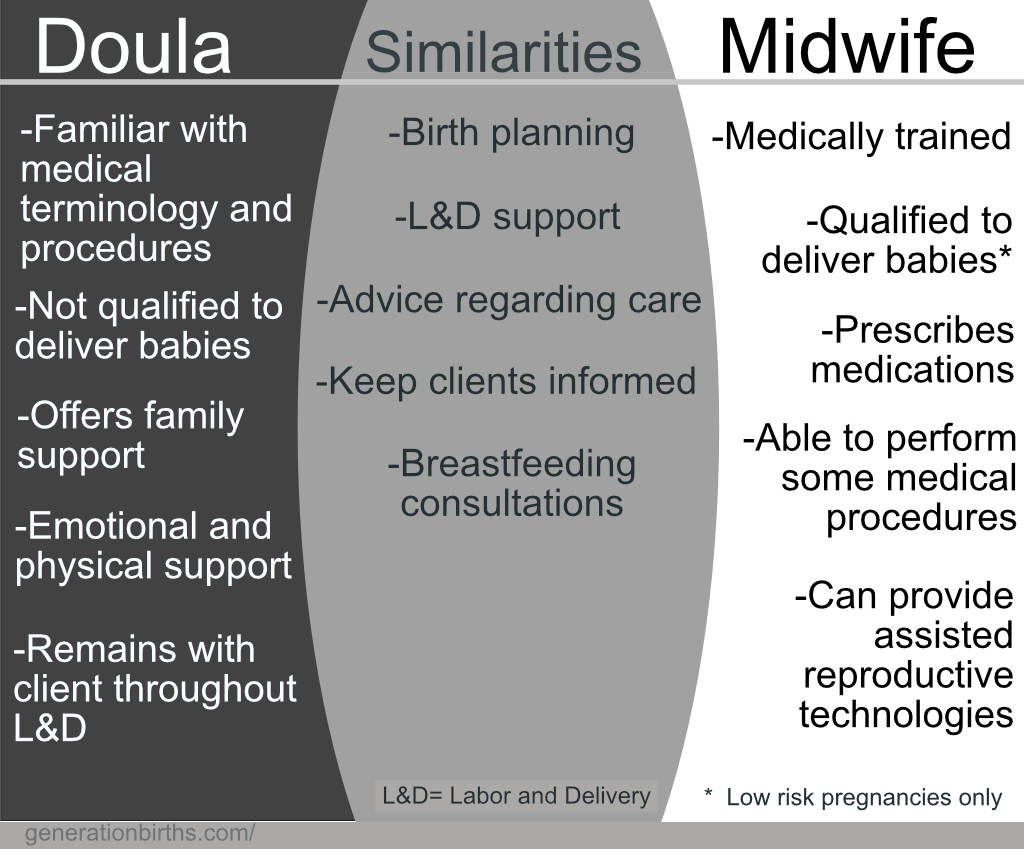What is the difference between a doula and a midwife
There are many similarities between a doula and a midwife. They both assist in prenatal, perinatal and postnatal care of birthing people. Both doulas and midwives are present during labor and delivery to support the laboring person and assist them in any way they can. This can be applying counter pressure, and helping the laboring individual change positions. They each are able to help write a birth plan, and give informed advice regarding prenatal perinatal and postnatal care.
But how do doulas and midwives differ? What can one do that the other is unable or unqualified to do? These are the answers we are going to find today. I will address here the functions and abilities of each of these perinatal professionals before, during and after labor and delivery.
A doula attends to the physical and emotional needs of the laboring person throughout the duration of labor and delivery. A midwife is a medical professional who assists at births. A midwife is qualified to deliver a baby, while a doula is not.

What a doula is qualified to do
The function of a birth doula
A doula is a professional birth coach (What is a doula). They provide physical and emotional support to laboring persons throughout the duration of labor and delivery. Typically a doula will have prenatal meetings with a client to devise and discuss their birth plan and to keep updated on the progression of the pregnancy. At these meetings clients will be made aware of the services that their doula has to offer and can make some premeditated decisions regarding their care come labor. Care services usually include, but are not limited to
- Massage – to manage pain, reduce swelling, improve circulation and provide relaxation and relief for sore muscles throughout labor
- Counter pressure – to alleviate back pain
- Breathing techniques – to improve oxygen, reduce pain, and provide a meditative calming effect
- Assists with laboring positions – to provide comfort and relieve pain
- Help transition to hydrotherapy – to alleviate stress, reduce joint pain
- Communication – a doula facilitates communication between the birthing person and the medical staff assigned to their treatment and care
A doula’s primary focus is the comfort and care of the birthing person. A doula will be present with you throughout the duration of your labor and delivery. This is the main function of a doula. Doulas usually also provide postpartum care. They will have a set number of visits that they make to check on the wellbeing of the birth parent and baby. You can also choose to hire a postpartum doula to spend more time helping with the transition of having a newborn. Doulas can also provide consultations and assistance with breastfeeding.
What a doula is not
A doula is not a medical professional and does not have any medical training and is not qualified to make medical decisions. A doula cannot deliver a baby. It is not a doula’s place to judge the choices you make regarding your birth plan, or subsequent choices regarding your care throughout labor and delivery. They should support you in the decisions that you make, and help you stay well informed. A doula should never push you one way or another to make a particular medical decision. A doula should be well versed in the medical practices and procedures applicable in a birth setting.
They can and should help you stay informed about medical practices that pertain to your birth plan and alternate plans. They should be able to help you come up with a birth plan that feels comfortable for you and makes sense for the progression and state of your pregnancy, and an alternate plan should things change course. This birth plan should include probable and possible medical procedures applicable to your individual preferences and circumstances. If your doula specializes in VBAC deliveries (vaginal birth after cesarean), cesarean sections, or the delivery of multiples they should be familiar with the clinical terms and procedures that are common with their specialty.

What is a midwife qualified to do
The functions of a midwife
A midwife has medical training and qualifications. Midwives are required to pass a national examination and most are also registered nurses. A midwife specializes in perinatal care, and reproductive health. Their services can include, but are not limited to:
- Perinatal care – providing pregnant people with routine medical care, information, and advice
- Family planning – prescription and implementation of birth control, assisted reproductive technologies
- Routine gynecological exams – pelvic exams, checking dilation
- Prescription drugs – pain relief, epidural, induction of labor
- Fetal monitoring – checking on the health of the fetus
- Labor and delivery support – continuously monitors the progression of labor, offers therapies to cope, can deliver a baby in low-risk pregnancies
Limitations of a midwife
While a midwife is a trained and certified health professional, and in some cases also a registered nurse, they are unqualified to deliver babies under certain circumstances. A midwife can deliver a healthy baby to a healthy person in a situation with few complications. The delivery of multiples, or a cesarean section birth are outside the realm of qualifications of a midwife. Under such circumstances a pregnant person can still choose to have the support of a midwife, but they would also need the care of an obstetrician (or OB-GYN).
A doula, a midwife and an obstetrician can all be a part of your birthing team. For complicated pregnancies it is advised that you have the care of an obstetrician. But you can also have a midwife and a doula if you choose. If your pregnancy is low risk you can choose to have only a midwife, or both a midwife and a doula. A doula cannot be your only care provider as they do not have the medical qualifications to ensure the health and safety of you and your baby.

Similarities
How are a midwife and a doula similar
The doula and the midwife both provide detailed and heartfelt care to birthing persons. They are able to help you write a birth plan that is harmonious with the state of your pregnancy and your wishes for labor and delivery. During labor and delivery a doula should be continuously at your side providing you with support, while a midwife may only check in on progress periodically and be present for delivery. But both are able to offer therapies such as counter pressure, massage, switching laboring positions, or transition to hydrotherapy (tub or shower). Both your doula and your midwife should continuously provide you with up to date, detailed and accurate information regarding your progress and care. They should help you to make informed medical decisions that align with your wishes and support you in these decisions.
Postpartum, both your midwife and your doula are able to provide breastfeeding support and advice. A postpartum doula can provide more day to day support, while a midwife can provide more clinical support.
Doulas focus on the needs of the birthing person throughout labor and delivery. Midwives focus on medical care and delivery of a healthy baby.
Health insurance coverage
Most midwives are covered by insurance to a degree, while most doulas are not covered by health insurance. So while a doula and a midwife may charge similarly for their services, the cost of a midwife will mostly be covered by your insurance policy. Midwife services can cost around $2,000, and doula services can cost anywhere from $500-$3000. Most midwives and doulas offer a sliding scale, to charge whatever a client is able to pay. And a payment plan can be agreed upon so that you do not need to pay the fee in full.
In summary
A birth team can look different depending on your circumstances. A midwife and a doula can both be a part of your birth team, working together with you to make birth a more approachable and easier experience. If you have your heart set on having a doula as a part of your birth team, they can work alongside your midwife and/or OB-GYN. In a low-risk pregnancy, you can choose to work with a midwife alone if you feel comfortable. With a high risk pregnancy that requires the care of an obstetrician you can still choose to have a midwife and/or doula on your care team as well.
Whatever you choose for your birth team, it is important that you feel supported and comfortable. Make sure you check the qualifications of your providers, and set meetings to choose a team that is right for you.
